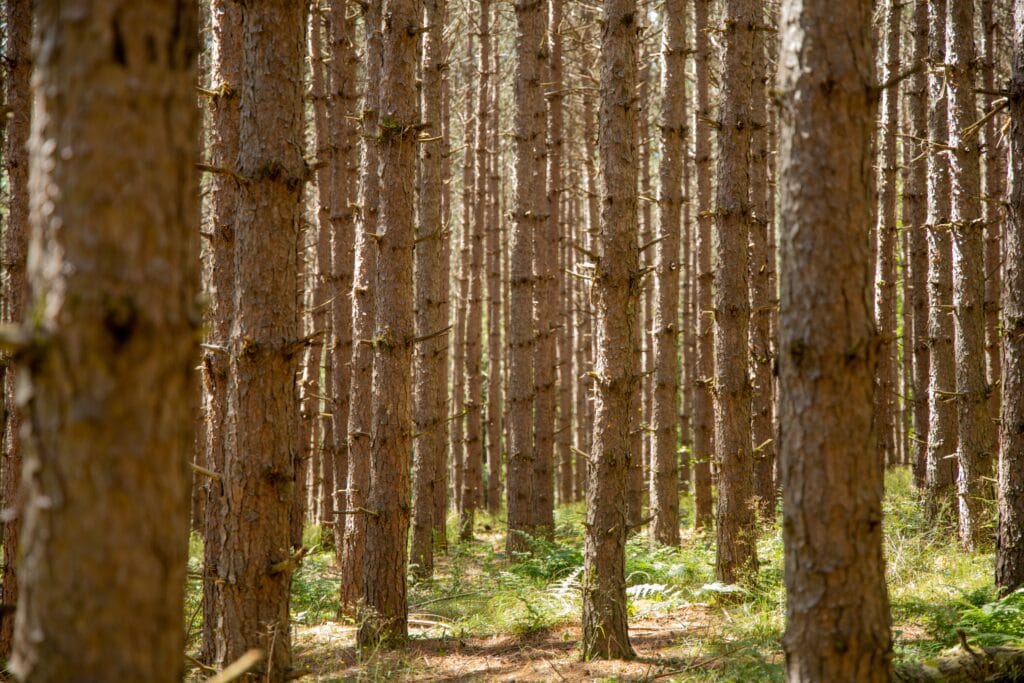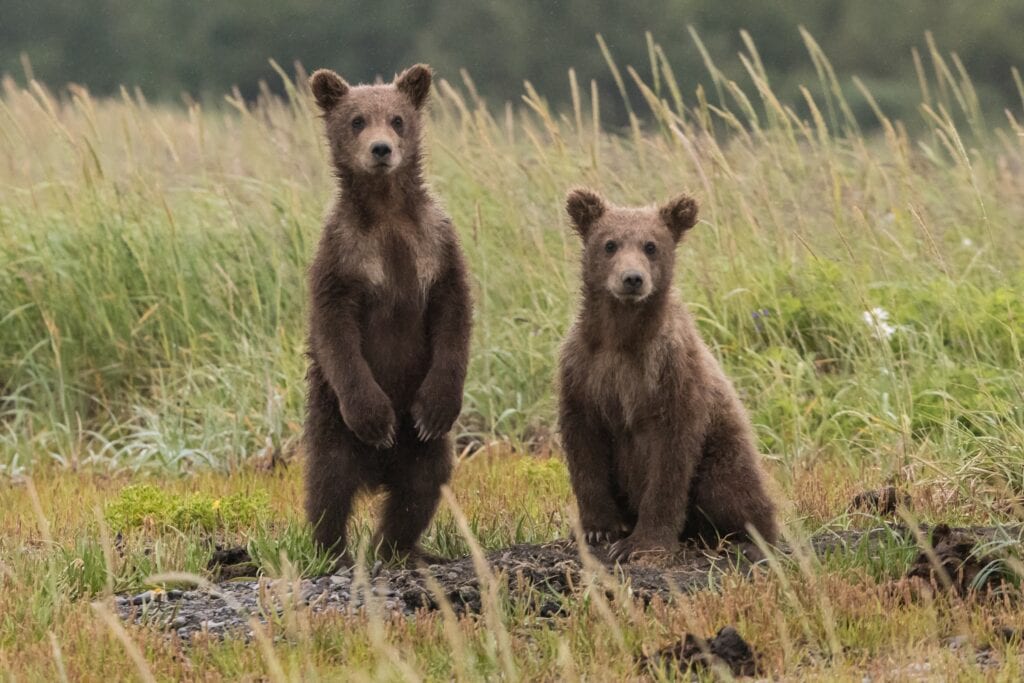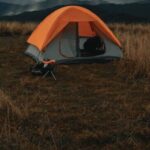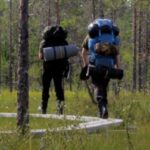If you are going to be camping in bear country, whether they are black bears or grizzly bears, there are some basic safety measures that you should take. And we do not only mean bear spray.
Adhering to these rules and regulations will reduce the likelihood of bears coming to your campsite in search of food. Avoiding bear encounters is crucial when you are in bear country.
The following safety precautions regarding bears are in place not just for your protection but also for the protection of the bears. Bears that often visit campsites in search of food may acquire a habitual behavior in which they lose their natural fear of people. And this might happen if they get used to the presence of humans.
Therefore, these bears are more likely to become dependent on food, make contact with humans, and ultimately get into unwanted interactions with humans, which may lead to the death of said bears or even humans.
So to avoid any issues, here are some ways to keep bears away from your campsite.
Top 9 Safety Rules to Follow to Ensure Bears Stay Away!
Bears are a regular sight over the majority of the continent of North America. There are three species of bears: black bears, brown bears, and grizzly bears. Below are some safety tips you can implement if you are camping in bear country and want to avoid a bear encounter! You should know what can attract bears and how to prevent it.
-
Explore the Organization of the Bear Triad Camping Site
When camping in bear country, you must ensure that you keep bears at a safe distance, so come up with a plan. In this particular scenario, you would want to arrange the three distinct areas of your campsite in the shape of a triangle.
There is a place to sleep, a place to hang food, and a place to cook. These three spaces would make up the three points of your triangle. These should be positioned at a distance of one hundred yards away from one another. Doing this will help you fend off a bear attack.
Establish your base of operations initially. The location of the kitchen and any hanging food should be upwind. And you can organize the rest of the campsite in whatever manner you choose.
If you choose to sleep at a spot that faces downwind, you run the risk of being the animal’s first tasty meal. Imagine the tallest point of the triangle to be your tent, while the other two points serve as the foundation of the triangle. Put the kitchen and the food cache in a location that is away from your tent.
-
Choose Your Foods Options Carefully
When planning camping in bear country, one of the things to think about is how to keep bears away from the food you bring with you. Doing this will help you avoid a bear encounter.
The more appealing the scent of food is to you, the more tempting it will be to other carnivores. We regret to inform you that this does not include fish, steak, or bacon.
-
Intelligent Storing of Food
This information on being safe around bears while camping might save your life and avoid a bear attack. If food is stored correctly, you might prevent an uncomfortable scenario.
Put anything that has a fragrance in a box or another container. And if you are near your vehicle, put the box or container in the trunk with the scented items. However, you may protect yourself from potential danger while not in your vehicle by stowing your food in the trunk. You can use one of the following strategies.
-
Install a Hang for Bears
 The classic bear hang is essential to any conversation when talking about keeping bears away from a campsite. People who don’t go camping frequently might save money by using a bear hang as an alternative to other, more expensive food storage methods. However, you will need a suitable tree to do this. Therefore, your branch must be at least 15 feet high and extend 4 feet from the tree’s main trunk. You want to make it so that the bear has difficulty getting to your food in any way they can.
The classic bear hang is essential to any conversation when talking about keeping bears away from a campsite. People who don’t go camping frequently might save money by using a bear hang as an alternative to other, more expensive food storage methods. However, you will need a suitable tree to do this. Therefore, your branch must be at least 15 feet high and extend 4 feet from the tree’s main trunk. You want to make it so that the bear has difficulty getting to your food in any way they can.
Bears are very good at recalling the location of the last time they discovered food. So choosing a tree that has not been used in the past is crucial. You may be able to tell by looking at the wear patterns on the branches.
-
Buy a Bar Bag or a Bear Canister
Utilizing a bear bag is the most effective method for keeping bears at bay while camping in the woods. These products may be found in various sizes and are portable and lightweight, depending on who made them.
A typical food storage cache weighs between 2 and 3 pounds. And it is an excellent choice for those who are going on trips. The average container has enough space to store enough food for one person for an entire week. On the other hand, if you’re more of a weekend warrior, you may want to go with something smaller and lighter designed to last for three days. Therefore, you must confirm that any canister you purchase has been certified safe by the Interagency Grizzly Bear Committee.
When you try out these products, you should bring your baggage with you so you can choose the one that is most suitable for you. If you want to try out bear tubes before buying them, you may rent them from outdoor stores or the Forest Service.
In addition, we recommend keeping containers of this kind of food storage at least 100 yards away from the area in which you sleep. You will thank us for this tip if you are in bear country.
-
Make Use of Coolers, Plastic Bags That Are Odor-Resistant, or Even Garbage Bags That Do Not Have a Fragrance
This bear-deterring advice is only helpful for campers who drive their vehicles. When you are in the woods, you should make every effort to use bear tubes exclusively.
The presence of any of these three items, in addition to food or personal items, may assist in preventing bears from entering your vehicle.
So if you have a hatchback or an RV, you should try to disguise the goods. Nevertheless, you should always try to store scented items in the trunk if that is an option. In circumstances such as these, I recommend making use of odor-proof bags. And this is because research and experience show bears may enter homes via open windows.
If you remember one thing from this article, it should be that you should never bring anything that has a fragrance near your tent.
-
Consider the Location
To stop bears from entering your campground and prevent bear attacks, you first need to put yourself in their shoes. For example, if a bear thinks a site seems good, you should steer clear of it! You want the most boring camping experience possible.
These enormous creatures congregate around food sources such as berry bushes and lakes. Before putting up your tent, it is essential to thoroughly examine the surrounding area to look for any signs of bear activity.
Furthermore, check for dead animals or signs of a struggle. You should probably avoid meeting the winner of the battle in your search. What you are looking for is an animal carcass. These remains show the possibility of a bear in the area. In addition to this, it has the potential to attract other predatory creatures.
- Bears will only relieve themselves in the area where they currently reside, so check for bear droppings.
- Bear tracks are a reliable indicator that you should keep looking for another location to camp.
- Diggings made by a grizzly bear require that you make a hasty exit and not turn back.
- Wild animal trails aren’t always dangerous, but there are situations when they may be.
- Claw marks on trees indicate that a bear does not want to share its territory.
-
Make a Bear Gate
When protecting a campsite against bears in bear territory, installing a bear fence is one of the more expensive solutions. However, this device can protect your tent with up to 6,000 volts of electricity.
Even if the bear does not pass, the anguish should be enough to scare it away and cause it to run away. Although black bears can become aggressive, it is best to use bear fences in locations inhabited by polar bears, grizzlies, or all of these species.
-
Immediately After Supper, Start Clean Up
Bears love human food, so when camping, protecting oneself from bears requires an effective cleaning. It is impossible to emphasize the significance of gathering every last fragment of macaroni or chip. Even something as little as a popcorn kernel might attract the attention of a ravenous bear. Thus your food storage area and your dining area must be clean.
Therefore, you must start meticulously cleaning as soon as possible after finishing dining. The more time passes after you release the perfume of delicious freeze-dried meals into the atmosphere, the greater the likelihood that you will draw the animals straight to your doorstep.

Did you know that bears have an exceptional capacity for detecting odors? Because of this, you should steer clear of doing the dishes when your triangle is around.
Instead, you should ensure that your location is a sufficient distance away from your shelter and downwind. Developed campsites often include facilities for washing your clothes and other personal goods.
Despite the advice specific individuals give, you should refrain from burying garbage or stale food. Keep your rubbish in bear-resistant containers until you can remove it from the area. And if you are using trash cans in the vicinity of a campsite, you should ensure they are bear-proof.
Care for Your Pets
If you are going to a region with bears, we recommend not taking your pet. However, if you do, you should treat pets even more like tiny humans than they usually are. Keeping people and pet food in separate refrigerators and pantries is vital. Never leave food or water for your pets near where you sleep.
In addition to that, make sure that you always keep your animals on a leash. Bears will not think twice about consuming your family’s pet if given the opportunity.
Also, remember that you can’t keep wild animals as pets under any circumstances. Neither should you treat them as such by feeding or petting them. Doing this might attract bears to your region. In addition, feeding them poses a danger.
Other Bear Safety Tips
We must note that not all bear encounters are bad; you may encounter harmless curious bears. But more often than not, it will be a negative bear encounter. Most of this article has been spent on points that will help you avoid bears entirely. However, if you end up encountering one, here are some extra bear safety tips.
- Always carry bear spray.
- Store food in bear-proof containers
- If you encounter an aggressive bear, play dead
- Deal with all food scraps efficiently
- Consider investing in bear bells
Key Takeaways!
When camping in bear country, it is necessary to take safety measures to protect oneself from other dangerous animals. Utilizing any of the abovementioned methods will significantly minimize your odds of coming across a bear. Nevertheless, anything can happen. The goal is to do everything humanly possible to mitigate the danger.
If you prepare yourself enough, the probability that you will conduct sensibly will increase, and your nervousness will diminish. Bear spray should always be carried with you, even if you don’t think you need it.
Always remember the adage, “better safe than sorry!”. Happy camping folks.





